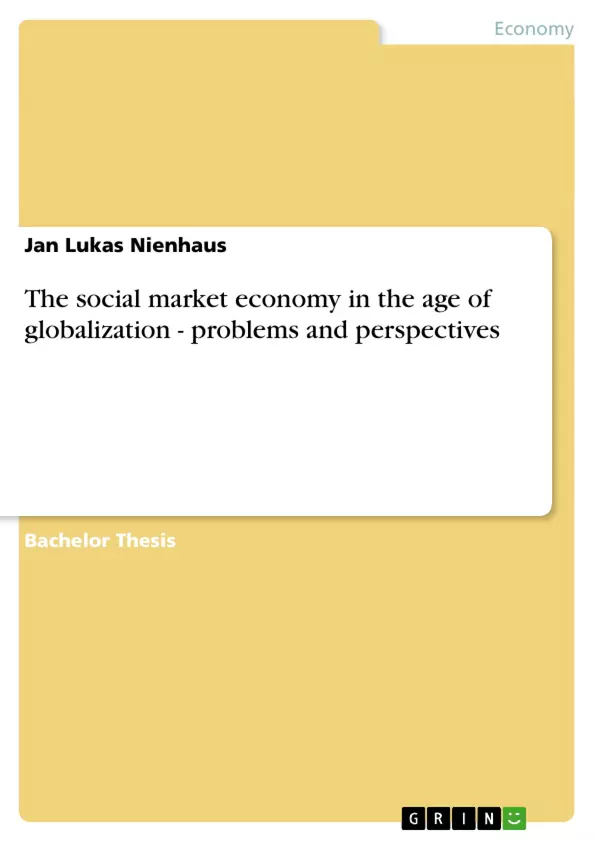The Federal Republic of Germany is a democratic and social federal state (Art. 20). In 1948, the Social Market Economy was introduced in Germany by Ludwig Erhard as the economic system. Since then, Germany has been acting under this guiding principle and found a legal affirmation of the concept in 1990 as it fixed the Social Market Economy as the basis for the economic union of the Federal Republic and Democratic Republic of Germany (“Grundlage der Wirtschaftsunion ist die Soziale Marktwirtschaft”, Art 1-3). In times of economic growth and prosperity, the Social Market Economy seemed to work well and further expansion of the social system did not cause any serious problems, but soon the circumstances changed. Important driving factors and trends like the reunification, the demographic development and the globalization have altered the conditions for successful economic policy. In the last decade, excessive national debts and high unemployment rates have revealed a serious crisis and initiated a strong debate whether the Social Market Economy is still able to adapt to and master the challenges in the age of globalization.
Inhaltsverzeichnis (Table of Contents)
- Introduction
- Social Market Economy in the Globalization
- The Concept of Social Market Economy
- Definition
- History
- Current Situation
- Globalization
- General Characterization
- Challenges of Globalization
- Discussion of Economical Impacts and Mechanisms
- Current Problems and Reforms
- Identification of Problems
- Agenda 2010 and Recent Political Reforms
- The Concept of Social Market Economy
- The Case of Denmark
- The Danish Success Story
- "Flexicurity" - The Danish Model
- Evaluation of Similarities and Constraints
- Summary
- Renovation of the Social State
- Mastering the Challenge of Globalization
- Lessons of the Danish Case
- A European Social Model
- The European Idea
- Social Market Economy in Europe
- Potential Benefits and Threats of a Single European Model
- Discussion of Perspectives and Alternatives
- The Probation of Social Market Economies
- Alternatives and Justification of the Social Market Economy
- A National Action Plan
- Conclusion
Zielsetzung und Themenschwerpunkte (Objectives and Key Themes)
This thesis examines the impact of globalization on the Social Market Economy in Germany, specifically addressing the challenges and opportunities it presents. It explores the need for adaptation and potential reforms to ensure the continued success of this economic model in a globalized world.
- The evolution and challenges of the Social Market Economy in the context of globalization
- The impact of globalization on national economies and the challenges of adapting to global competition
- The Danish "Flexicurity" model as a potential solution to the challenges posed by globalization
- The potential benefits and threats of a European Social Model, particularly in terms of social market principles
- Exploring alternative economic models and advocating for a proactive approach to navigating the challenges of globalization
Zusammenfassung der Kapitel (Chapter Summaries)
The thesis begins with an overview of the Social Market Economy, tracing its origins and outlining its current state within the context of globalization. Chapter 2 explores the concept of globalization itself, delving into its economic impacts and the challenges it presents to established economic models.
Chapter 3 focuses on Denmark as a case study, examining its successful economic policy and the "Flexicurity" model, which balances flexibility in the labor market with social security. This chapter assesses the applicability of the Danish model to Germany and highlights the lessons learned from this successful example of economic adaptation.
Chapter 4 delves into the potential benefits and threats of a European Social Model, considering its potential to harmonize social market principles across the continent. The chapter explores the challenges and opportunities associated with implementing a unified social market economy within the European Union.
Chapter 5 discusses alternative economic models and argues for a proactive national action plan to address the challenges of globalization. This chapter suggests strategies for navigating the complexities of globalization while preserving the core values of the Social Market Economy.
Schlüsselwörter (Keywords)
Social Market Economy, globalization, economic challenges, "Flexicurity" model, European Social Model, economic competitiveness, social justice, labor market flexibility, national action plan.
Frequently Asked Questions
What is the Social Market Economy (Soziale Marktwirtschaft)?
It is Germany's economic system, introduced in 1948 by Ludwig Erhard, which combines free market competition with social balance and security.
How does globalization challenge the Social Market Economy?
Globalization increases global competition, affecting labor markets, national debts, and the sustainability of traditional social security systems.
What is the Danish "Flexicurity" model?
Flexicurity is a model that balances flexibility for employers in the labor market with high social security and active labor market policies for employees.
Could Germany adopt the Danish model?
The thesis evaluates similarities and constraints, suggesting that while lessons can be learned, national differences must be considered for successful implementation.
What is the "European Social Model"?
It is the idea of harmonizing social market principles across the European Union to create a unified approach to social justice and economic competitiveness.
- Quote paper
- Jan Lukas Nienhaus (Author), 2008, The social market economy in the age of globalization - problems and perspectives, Munich, GRIN Verlag, https://www.grin.com/document/90925



